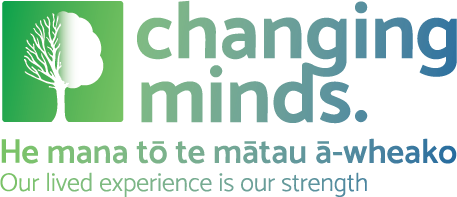Let’s get on this waka!
Let’s get on this Waka! Is Changing Minds’ response to the Mental Health and Addiction Government Inquiry.
On the back of the release of the Inquiry’s report, Changing Minds is optimistic about the future of mental health and wellbeing in Aotearoa and see this is the opportunity New Zealand needs to lead the way globally.
The broad areas the recommendations cover reflect much of the kōrero we listened to over the past 10 months, and although there are gaps, the report has fixed the broken rudder that kept us going around in circles. We fundamentally believe that if all of us are invested in this paradigm shift only good things will happen.
Nobody is missing in this report in terms of the responsibility we all have. It has been clearly signalled that wellbeing is no longer the single responsibility of health to fix and that the bio-medical approaches we once relied upon at the expense of choice and self-determination are a thing of the past. Our collective role (i.e. the groups we represent that will be most affected) is to keep paddling this Waka as a team.
The recommendations are just that, recommendations. It is we, (communities of people who are invested in improving wellbeing for all) who have been placed explicitly at the centre of this future, and we will be tasked to implement them, including implementing the localised solutions.
We acknowledge our own concerns where we would have seen more detailed recommendations for example:
Māori and Pacific People’s needs are unique and separate but are often grouped together in the report. To ensure inequity is redressed, Māori and Pacific needs need to be focussed on independently.
Equally Well gets a passing mention however not acknowledging the role of physical root cause identification and treatment as well as the importance of utilising emerging evidence in nutritional psychiatry as a viable intervention to reduce harm was a missed opportunity for significant practice change.
There are slim pickings as to how to integrate lived experience leadership outside the “peer workforce”, and no mention of valuing lived wisdom in positions outside support roles which is disappointing as this would integrate the power of contact into our services, leading by example by showing that recovery is not possible, but probable.
And possibly most disappointing for us is there was not a separate recommendation area for growing the work in decreasing social isolation, internalised stigma and discrimination, as we know that these are not only still the most significant barriers to recovery and economic/societal contribution, but not addressing these ongoing issues contributes directly to our suicide rate.
But let’s not let the gaps get in the way of us ensuring a brighter future. The opportunity to contribute to how the government implements the recommendations is still on the table, and that’s why we’re here! To lend our help, tap the rudder and ensure the recommendations are implemented in a way that values the communities we serve.
In acknowledging the gaps and niggles, perhaps we also need to acknowledge that we must start paddling from somewhere, and this is a better pier than there’s ever been. The creek is running downstream now, and there are many individual and collective paddles creating momentum.
This report cements an intention to shift from the powers that harm, to communities, services, whānau and individuals that will help. Although ideally, it would have been explicit, it includes some guiding thinking about who are the Cox in this boat (Maori, lived experience, whānau, Pasifika, LBGTQIA+).
We believe the Inquiry panel heard the call from those of us who live and work from the perspective of having survived and thrived despite mental health challenges. We called for a complete paradigm shift, where those who need help are no longer unwilling participants in their care, but leaders in their own recovery and the call was answered not only by the panel but in Parliament before Christmas.
We are buoyed by the human rights approach, and excited by the prospects of a Mental Health and Wellbeing Commission, a cross-government Social Wellbeing Agency, and a Māori Ministry. This fast running river now signposts a requirement to fairly commission and strengthen non-government services, and properly strategise health promotion and suicide prevention initiatives.
Perhaps the biggest cause for celebration within our whānau of people with lived experience, however, is a clear direction to repeal the Mental Health (Compulsory Treatment and Assessment Act). The Act contravenes the United Nations Convention on the rights of People with Disabilities which New Zealand ratified in 2008 and 10 years later we are still trying to end compulsion.
The Inquiry agrees with our calls to increase choice and access for all people, apply culturally appropriate practices, and place stricter controls around access to alcohol, suggesting we finally treat harmful use as the health and social issue it is, not a criminal one.
Excitingly, peppered throughout the whole report is the extensive and explicit mention of a paradigm shift from big psychiatry to big community.
All this is a list of quality building materials that will potentially create a ship worthy of carrying our future generations if built thoughtfully and intentionally.
Changing Minds has and will continue to collaborate with everyone willing to pick up a paddle, and promise to collect, articulate, and activate the strategic voice of lived experience for the purpose of creating enduring positive change.
Now it’s up to ALL of us to galvanize our communities to make sure nobody who should be in this boat misses the ride. Our challenge to you is don’t wait for a ticket – strap on your life jacket and jump aboard!
Download He Ara Oranga : Report of the Government Inquiry into Mental Health and Addiction

